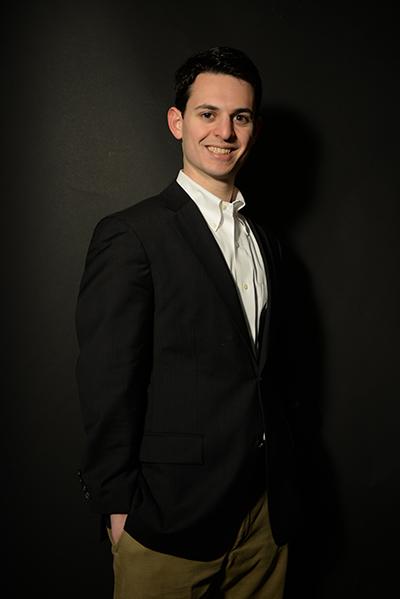Year: Junior
Major: International Affairs
Hometown: Freehold, N.J.
Clubs/Activities: Army ROTC, Kappa Alpha
Favorite GW moment: Being late to class because of the presidential motorcade
Dream job: Army intelligence officer, politician or businessman. I’m all over the map. I’ve got time to do all of them.
What do you think is the biggest problem at GW: Red tape. GW doesn’t have huge issues, they have a lot of small issues.
How far are you in the second season of “House of Cards”: Ep. 9
What would you name the new residence hall? “The Hippodorm”
How many GW basketball games have you been to so far? Three
Favorite Winter Olympics event? Alpine skiing
Junior Chris Stillwell has worked closely with some of GW’s highest ranking officials this year, and he knows how tough it can be to make progress on a large scale.
Stillwell, one of four candidates for executive vice president, has narrowed his platform to goals he believes are feasible while also taking charge of the 38-member SA Senate.
“You can have an initiative and it can take months to do just because you need certain people’s approval, a lot of research, a lot of work,” said Stillwell, who has served a year in the SA Senate. “It’s good and bad. Because you have all your facts behind you, but just because it’s a bureaucracy it takes a really long time to do anything.”
Stillwell’s platform calls for priority registration for veterans, new furniture in Gelman Library and a better system of incorporating student input on the Board of Trustees.
He said all of his initiatives would require a cohesive SA Senate and a strong relationship with University officials. Working off the relationships of the current SA administration, the junior said he would act as a bridge between students and top leaders.
He also wants to make it more clear how students can provide feedback to the Board of Trustees, the University’s top governing body which meets on campus four times a year.
Unlike some similar institutions, like American University, GW’s board does not include student representation, though current SA leaders are allowed to sit in on some committee meetings.
“It’s an unofficial system,” Stillwell said. “I would like to see the Board of Trustees and the administration actually have a concrete definition in their governing documents saying that this is how student input is put into the Board of Trustees.”
Stillwell spent four months writing a 35-page report about a potential student representative on GW’s board. The committee shared its report with the Board of Trustees last week, but Stillwell has said it would remain under lock and key from students to prevent the SA members campaigning this spring from turning the report into a “political stunt.”
Stillwell also wants to bring more administrators to senate meetings, which he said would improve ties to top officials while encouraging senators to be more active in pursuing their own goals.
“As chair of the senate, I want to make sure they’re doing stuff – bills are coming out, they’re going out and improving student life,” Stillwell said.
A member of the SA finance committee, which controls more than $1 million in student funds, Stillwell said he bring an edge to the executive vice president role. This past year, he successfully lobbied for graduate student organization funding, as well as a streamlined room reservation process for the Lerner Health and Wellness Center.
After Gelman upgraded its entrance floor in the fall, Stillwell said he wants improvements in the library to spread to the other floors as well. He is calling on the University to replace battered furniture and swap out old chalkboards with whiteboards.
Those demands will likely lead to a tough battle for funds, given Gelman Library’s historically poor fundraising record and the University’s competing interests to fund new collections in the building.
Stillwell, an Army ROTC cadet, will lobby to give student veterans priority registration, ensuring they don’t fall behind on the classes they need to take.
“With priority registration, they can schedule around their jobs, schedule to graduate early,” he said, adding that student veterans only receive G.I. Bill benefits for 36 months.
ROTC members are now eligible for priority registration, but Stillwell seeks to extend this privilege to veterans, who often face tight time constraints. He expressed concern about getting all veterans to qualify, but said that talks with administrators so far are going well.




